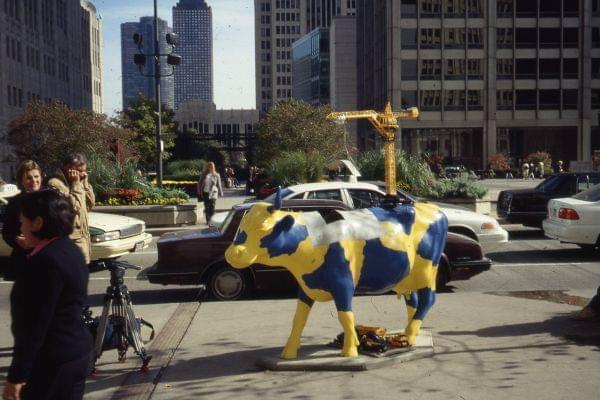Cows On Parade Art Back in Chicago; Illinois Gerrymandering; ICE Facial Recognition; Divorced Women Name-Change Law

Cows on Parade in 1999 in Chicago. Steve Tiesdell/Flickr(CC BY 2.0)
Two decades ago, hundreds of life-sized cow sculptures in Chicago ignited a worldwide interest in public art. Now, more than a dozen are back in the city for the month of July. Plus, Illinois Democrats have drawn our state’s election maps for years, and they’ll probably get another chance after the 2020 census. And, federal immigration authorities tried to access Illinois driver’s license photos. We’ll hear from the Illinois Secretary of State’s office about why they said "no" to that request. Also, divorced women could more easily revert back to their maiden name with a new Illinois law.
Democrats have controlled both chambers of the state legislature since 2003. In the House, they’ve held the majority for 36 of the past 40 years, and for much of that time they’ve been led by Speaker Michael Madigan.
This has given the party control of not just the legislative agenda, but our state’s election map.
In a ruling by the Supreme Court late last month, Democrats will continue to control that map in the future including after the next census.
Christopher Mooney is a professor of state politics at UIC and the Institute of Government and Public Affairs. Rick Pearson is a Chicago Tribune political reporter and host of Sunday Spin on WGN.
Looking for a visual of #Gerrymandering? Check out IL's 4th Congressional District. @rap30 explains it was drawn to unite two geographically separate areas of Latino voters and to empower them to elect Congressman Jesús "Chuy" García. pic.twitter.com/3W7Dl6IRJP
— The 21st (@21stShow) July 15, 2019
Also--
For weeks, the Trump administration has said they would step up raids in some cities to take undocumented immigrants into custody for deportation.
Raids in cities all over the country were planned for yesterday. But it’s unclear how many arrests were actually carried out. At this point, it doesn’t appear there have been any "mass raids" that President Trump originally announced. Still, the threat of these raids brought thousands of people in Chicago out in protest.
When we hear about ICE raids, we often think about officers arriving at someone’s house. Certainly, that’s a big part of what brought those thousands out in Chicago this weekend.
But there’s another way that ICE has been searching for people. Reporting earlier this month from The Washington Post found that from 2014 to 2017, ICE tried to sift through millions of driver’s license photos in several states using facial recognition technology.
Only a small number of states complied with ICE’s request for the data. And here in Illinois, the Secretary of State’s Office said no.
Dave Druker is a spokesperson for Illinois Secretary of State Jessie White’s office. To talk more about the implications of facial recognition technology being used by ICE and other law enforcement agencies, Adam Schwartz joined us. Schwartz is a senior staff attorney with the Electronic Frontier Foundation, a nonprofit that advocates for user privacy in tech.
"The false positive rate is much higher for people of color and for women," says @Adam_D_Schwartz about facial recognition technology.
— The 21st (@21stShow) July 15, 2019
"Even when the accuracy problem is solved there will continue to be a racial impact."
Plus--
Getting divorced is often a long and stressful process, with lots of emotions and lots of paperwork. There are lots of hard decisions to make like money or custody of children.
Many women also have to decide what to do with their last name. If they took their husband’s name, they may want to either keep it or change it back after the divorce.
But if they do want to change their last name - back to what it was before marriage - in many cases, they’re required to do something that feels pretty old-fashioned: announcing their name change in a local newspaper.
Kate Thayer is a features reporter with the Chicago Tribune. She joined us to talk about a new Illinois law that would make it easier for divorced women to revert back to their maiden name.
If women want to change their last name (after a divorce) back to what it was before marriage, in many cases they’re required to announce their name change in a local newspaper.
— The 21st (@21stShow) July 15, 2019
More w/@knthayer NOWhttps://t.co/1KBHtE2pDi
And--
20 years ago, if you were interested in experiencing the most talked about art in the city of Chicago, you weren’t going to the Art Institute or visiting a fancy gallery. You simply had to walk around the loop to see what the fuss was about.
In the summer and fall of 1999, there were more than 330 different life-size fiberglass cow sculptures in the city. Painted with different themes and colors, the Cows on Parade exhibition was wildly successful. But, back then the cows weren’t just a big deal for Chicago, they also changed the public conversation worldwide around what public art could be.
Now, 20 years later, more than a dozen of the cows are back on the Magnificent Mile for the month of July.
The original Cows on Parade exhibition was inspired by cow sculptures that Magnificent Mile Shoe Store owner Peter Hanig saw on his family vacation to Switzerland. He joined us on the line. Nathan Mason is the curator of exhibits and public art for the city of Chicago. Walt Chadick is the Chair of the Public Art Committee for the Magnificent Mile Association in Chicago.
"Some people thought it might have been hokey," says Walt Chadick from @TheMagMile about the cows. "They thought the same thing about the Bean."
— The 21st (@21stShow) July 15, 2019
"If you think it's hideous, some other person thinks it's magnificent."
